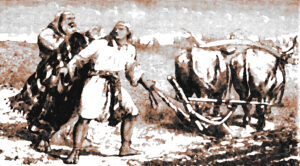Previous Post
It is also the purpose of a prophet to build and plant. A prophet will not only deal with correction, rebuke, and judgment, moving in the authority of God to counter the counterfeit, and expose deception be it through the verbal word or prophetic action, but the prophet can also edify, counsel, exhort and uplift hearts.
To build is to construct, establish or cause to increase. Consider it had not rained for many days in Israel and after Elijah slew all Baal prophets, he not only established that the God of Abraham is the true God and Baal is an idol but he brought rain causing Israel to increase. 1 Kings 18:45: And it came to pass in the meanwhile, that the heaven was black with clouds and wind, and there was a great rain. To plant is to establish or institute. Elijah established not only that the God of Abraham is the true God but also the fear of God in the children of Israel.
Consider that once something is destroyed and uprooted, there is no foundation. A prophet deals only in Truth, and so by speaking the truth and by speaking the will of God, the foundation of Jesus can be rebuilt in a person’s life, in a ministry, or even in a nation. This is important to remember because God’s intention is to restore, so once something is destroyed there needs to be restoration. Jesus came to redeem and restore, thus destroying first the work of sin and then rebuilding by connecting us again with the Father. A prophet by the leading of the Spirit of the Lord can provide such words of clarity, direction, edification, and wisdom in order to bring about restoration. Thus a process of planting and rebuilding follows. A prophet cannot merely just want to destroy and tear down, for if the prophet truly follows God, then the prophet knows there must be something built to God’s Glory in the place of what has been destroyed.
The prophets spoke of judgment over Israel and spoke of God’s correction, yet they always spoke of some kind of future restoration and hope. This is because, in the process of tearing down, there must be some kind of process of rebuilding. Consider for example Isaiah 40, Jeremiah 30, 33, and Ezekiel 36. Joel spoke of in chapter 2 of the promised deliverance, and future blessings in chapter 3. Zachariah 10 speaks of God’s blessing of Judah and Ephraim while Zachariah 13 and 14 speaks of Israel’s restoration that will come with judgment against all things false and against the nations that opposed God’s people.
Consider Isaiah 1: 25 “And I will turn My hand against you, And will [thoroughly] purge away your dross as with lye And remove all your tin (impurity). 26 “Then I will restore your judges as at the first, And your counselors as at the beginning; Afterward you will be called the city of righteousness, The faithful city.” 27 Zion will be redeemed with justice
And her repentant ones with righteousness. 28 But rebels and sinners will be crushed and destroyed together, And those who abandon (turn away from) the Lord will be consumed (perish).
Here we see both the process of uprooting and destroying in the form of judgment, before the promise of restoration. Indeed, God restores the foundation, but first, the false foundations need to be destroyed. This is the role and task of the prophet, declaring what needs to be destroyed and what needs to be restored, thus planted and rebuild. We see this action clearly in the days of Gideon who first destroyed the altar of Baal before building an altar to the glory of God.
Isaiah also spoke of restoration in chapter 9 and of course, chapter 53 which is a prophetic word of the coming Messiah – Jesus – who will restore all things. Jeremiah 23 also spoke of the coming of the Lord. In Jeremiah 3 we read how God invites repentance, despite the prophet’s warning of judgment and captivity: 11 And the Lord said to me, “Faithless Israel has proved herself less guilty than treacherous Judah [a land of renegades]. 12 Go and proclaim these words toward the north [where the ten tribes have been taken as captives] and say, ‘Return faithless Israel,’ says the Lord; ‘I will not look on you in anger. For I am gracious and merciful,’ says the Lord; ‘I will not be angry forever.
The long-term success of the children of Israel was dependent on their willingness to meet God’s conditions. If they would walk in His statutes, keep His commandments, and “perform them,” if they would “diligently obey” Him, observing “carefully all His commandments,” He would bless them. He would look on them favorably, confirm His covenant with them, and set them “high above all nations of the earth” (see Leviticus 26:3–13; Deuteronomy 28:1–14). But if they would not obey, then multiple curses would come upon them with increasing severity and overtake them (Leviticus 26:14–39; Deuteronomy 28:15–68).
As we know from their history, the Israelites failed to follow God faithfully, especially once the kingdom of Israel split in two in the 10th century BCE. As a result, they were eventually removed from their land in two separate exiles to Assyria and Babylon. A series of intensifying curses thus became the model for Israel’s fate. The major and minor prophets who warned of their imminent downfall often made the connection with these earlier prophetic statements. Further, they spoke of the prophesied blessings in terms of Israel’s restoration.
Writing in the eighth century BCE, mainly to the northern tribes known as Israel or Ephraim, Hosea’s messages were about coming captivity. Beginning with Jeroboam II in Samaria, he prophesied during the reigns of more kings than any other prophet about the curses that would come on the 10 tribes. About a quarter of his book deals with 20 of the 27 curses mentioned in the Pentateuch.
Jeroboam I had led Israel into idolatry about two hundred years earlier by setting up golden calves at Bethel and Dan, creating his own form of religion, and avoiding the temple at Jerusalem. The nation never really recovered from these actions. By the time of Hosea, complacency had taken them far from God. His message to them would be acted out by the prophet, who would take a prostitute for a wife—a sad picture of what Israel had become to her God. They would have three children, whose names would represent God’s rejection of Israel. In this way, God announced that He would bring an end to the kingdom of the house of Israel, a people on whom He would no longer have mercy, nor be their God and figurative husband. Among many reversals, they would be cursed with fear, sickness, famine, war, death, and exile.
The result of failing to heed God’s escalating curses, which should have brought about repentance, could end only in captivity and exile: “They shall not dwell in the LORD’s land, but Ephraim shall return to Egypt [figuratively], and shall eat unclean things in Assyria” (9:3). Their rejection of His law would deliver them to a new, fierce overlord: “He shall not return to the land of Egypt; but the Assyrian shall be his king because they refused to repent. And the sword shall slash in his cities, devour his districts, and consume them, because of their own counsels” (11:5–6).
These prophecies were fulfilled in the attack on the northern kingdom begun by the Assyrian king Shalmaneser. The author of 2 Kings gives the reason for the end of the kingdom and the exile in terms of worship of foreign gods, establishing high places for idolatry, stubborn refusal to change, rejection of God’s law, and witchcraft and divination (17:7–18)—the same sins that Hosea enumerated. He concludes, “So Israel was carried away from their own land to Assyria, as it is to this day” (verse 23).
Hosea, however, also wrote about the blessings that would come in a future restoration of Israel to its land. These passages are interspersed with the pronouncement of the curses outlined above. Leviticus and Deuteronomy list 10 kinds of restoration blessings for repentance and obedience (see Leviticus 26:40–45; Deuteronomy 30:1–10). These are the basis for the positive outcome of Hosea’s prophecies. They include renewal of the covenant, canceling the curses and restoring blessings for obedience (Leviticus 26:3–13; Deuteronomy 28:1–13), renewal of God’s favor, true worship, increased population, agricultural abundance, prosperity, and health, return to the land, unification of the tribes, defeat of enemies, and freedom from death and destruction.
Hosea speaks of the return of Israel and Judah to the land as “My people” (Hosea 1:10–2:1); of the re-establishing of the marital relationship between God and His people (2:14–23); of the restoring of godly kingship (3:5); of healing and recovery (6:1–3); of righteousness (10:12); of love for Ephraim (11:8–11); and of Israel’s complete restoration (14:1–8).
There are thus plenty of Scriptures pertaining to the prophets where they speak judgment, destruction, and tearing down, but also of planting and rebuilding. This is the nature of God, for God wishes to tear down what opposes His Kingdom, yet He will restore His order to His Glory. This, therefore, speaks of laying the correct foundations – the foundation of Jesus, thus a foundation of truth, justice, and righteousness.
When we deal with planting and building, this also speaks of encouragement of the brethren, which is an important aspect of the prophetic ministry. Everyone who prophesies speaks to men for their strengthening, encouragement, and comfort he who prophesies edifies the church (1 Corinthians 14:3,4) The words of the prophets will build up and strengthen the church. This will be especially important in times of trial and tribulation. Silas and Judas were two prophets who encouraged the church in Antioch. Judas and Silas, who themselves were prophets, said much to encourage and strengthen the brothers (Acts 15:32).
The scriptures give a number of examples of prophets who encouraged the leaders of their nation to act boldly. When Asa heard these words and the prophecy of Azariah son of Oded the prophet, he took courage. (2 Chronicles 15:1). Other examples:
Then Haggai, the Lord’s messenger, gave this message of the Lord to the people: “I am with you,” declares the Lord. So the Lord stirred up the spirit of Zerubbabel son of Shealtiel, governor of Judah, and the spirit of Joshua son of Jehozadak, the high priest, and the spirit of the whole remnant of the people. They came and began to work on the house of the Lord Almighty, their God, on the twenty-fourth day of the sixth month in the second year of King Darius (Haggai 1:13-15).
Now Haggai the prophet and Zechariah the prophet, a descendant of Iddo, prophesied to the Jews in Judah and Jerusalem in the name of the God of Israel, who was over them. Then Zerubbabel son of Shealtiel and Jeshua son of Jozadak set to work to rebuild the house of God in Jerusalem. And the prophets of God were with them, helping them (Ezra 5:1,2).
So the elders of the Jews continued to build and prosper under the preaching of Haggai the prophet and Zechariah, a descendant of Iddo. They finished building the temple according to the command of the God of Israel and the decrees of Cyrus, Darius, and Artaxerxes, kings of Persia (Ezra 6:14).
Next Post







